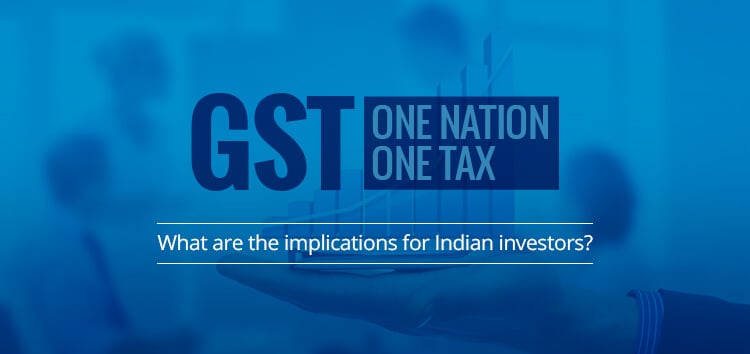
As India prepares to launch the historic Goods and Services Tax (GST) effective July 01st, the big question is whether it will impact investors in a big way. Obviously, a mammoth implementation of such proportions is going to have an impact on your investment costs and your investment strategy. Here is what you need to know about the interplay of GST and your role as an investor…
What happens to equity investments?
When you buy and sell equities, there are lot of charges that are debited to you. Apart from the brokerage that is charged by your broker, there is a securities transaction tax (STT), state-level stamp duty, SEBI charges, turnover tax and service tax. The service tax on your brokerage is currently being calculated at 15% of the brokerage amount paid (14% service tax + 0.5% Swacch Bharat Cess + 0.5% Krishi Kalyan Cess). With the service tax being subsumed into your overall GST, the rate of GST on financial services stands modified from 15% to 18%. So on a 1% round brokerage, your overall cost due to the subsuming of service tax into GST will be about 0.03% or 3 basis points. From a long-term investor’s perspective, this may not be too significant since the overall shift is just about 3 basis points. However, for short term traders, this 3 basis points additional cost will change the economics of churning their funds in the equity markets. Whether that actually impacts the eventual volumes and liquidity in the markets remains to be seen. One thing investors and traders need to watch out for in the equity market is whether this higher cost results increases the basis risk or not.
How will GST impact your mutual fund and PMS investments?
No prizes for guessing! The shift to GST will surely increase the total expense ratio (TER) of mutual funds. It is conservatively estimated that mutual funds will see their expense ratios going up by 5-6 basis points. That means, from the current level of around 1.50% TER, the expense ratio may go up to around 1.56%. Most retail investors who come through the SIP route are long term investors who are into mutual funds for creating long term wealth. Hence a 6 bps increase in the TER is unlikely to significantly impact their overall returns. However, for corporates, institutions and HNIs who travel in and out of debt funds and liquid funds more frequently, this could be a worry. Many corporates and institutions normally park their temporary liquidity surpluses in debt funds and liquid funds to make their money more productive, even as it is idle. It remains to be seen how this higher GST rate will impact the economics of MF investments by corporates and institutions. Similarly, portfolio management services (PMS) providers charge an annual PMS fee on which service tax is charged. This will go up from 15% to 18% and could come back to haunt PMS providers in years when the returns have been below par.
New equity market opportunities for equity investors…
For equity market investors; especially those looking at active investment ideas, the implementation of GST could open new horizons. Let us look at some of the deeper implications for Indian investors. Firstly, there is likely to be a boost to the GDP by 1-2% over the next couple of years. On a GDP base of $2.5 trillion, this could create a wealth effect of $50 billion each year. That will surely reflect in equity market valuations. Secondly, the introduction of GST will open up huge opportunities for sectors like FMCG, automobiles and logistics. Currently, logistics and distribution networks are created by Indian companies based on state level taxes and levies. Going ahead, these networks will be created based on business logic. That will mean a huge opportunity for these sectors and a huge investment opportunity opening up for equity market investors. Lastly, the beauty of GST is all about input tax credit (ITC), which becomes seamless under GST. But there is a nuance here! State GST taxes can be claimed as credit against state GST payouts and central GST taxes can be claimed as credit against central GST payouts only. Cross credits are not permitted under GST. This could force a lot of companies to tweak their business to become more state-driven or less state-driven. These are some key opportunities and risks that investors need to be focused on.
To encapsulate, GST will surely lead to a marginal rise in the cost of servicing investments and executing your transactions. However, as an investor in equity mutual funds or direct equities, you are more interested in the bigger picture. Back in 2004 when STT was first introduced by the government, most analysts predicted the death of market volumes and liquidity. However, in the 12 years since then, liquidity and market volumes have grown manifold. The crux of the story is that good regulation is eventually positive for markets and investors. From a broader perspective, the benefits of GST are likely to outweigh the short term costs. That could be the good news for Indian investors!
Published on: Jul 1, 2017, 12:00 AM IST
We're Live on WhatsApp! Join our channel for market insights & updates
